Pawan Luthra: Barry O’Farrell, you’ve just returned from three years in New Delhi as High Commissioner of Australia. Your tenure was bookended on one side with the worst pandemic in 100 years, and on the other, successful visits by two prime ministers to each other’s countries. Somewhere in between, a very successful economic and trade agreement was also signed between India and Australia. Welcome back, Barry, and thank you for joining us at Indian Link.
Barry O’Farrell: Terrific to be back and terrific to be talking to you face to face again.
Pawan Luthra: When I interviewed Australian Foreign Minister Penny Wong a few weeks ago she promised to build on her Hindi vocabulary of one word, Namastay. If you had to share your knowledge of Hindi words with her, what would the range be?
Barry O’Farrell: My favourite Hindi word is Mazboot (strong). I just think it’s got a great sound about it. And of course Karenge (to do). So my three favourite words are Namashkar or Namastay, Mazboot and Karenge, because ‘strengthen the relationship’ is one of the things we want.
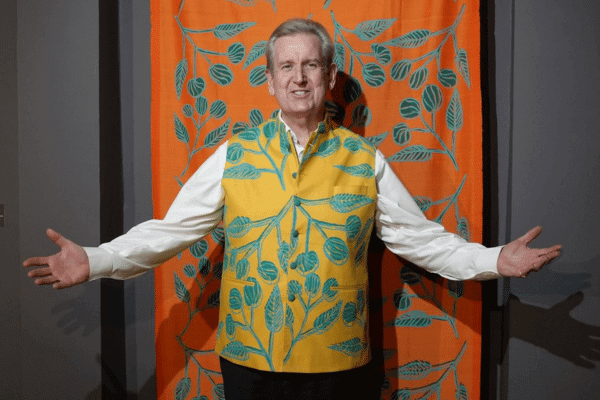
Pawan Luthra: Were you the person who hashtagged the term Dosti (friendship)?
Barry O’Farrell: I was the person that put together the four Ds. I was tired of the three Cs – Cricket, Commonwealth and Curry. And I am not sure India was particularly fascinated about Commonwealth either. We all agreed on cricket. So, we thought of the four Ds – Democracy, Defence, Diaspora, and Dosti. But I know that Prime Minister Modi took it to another level. And if he says, out with the Cs, out with the Ds, I’m not going to complain or argue with him.
Pawan Luthra: Looking back at the last three years, what would be the heading of this chapter of your life?
Barry O’Farrell: A remarkable adventure. Being Premier of a state is quite an honour, but can I tell you that representing your country, as an Ambassador or High Commissioner overseas, takes it to another level. So it’s a highlight, if it’s not the highlight of my life.
Pawan Luthra: When you were sounded out as being the potential High Commissioner, what went through your mind?
Barry O’Farrell: It was a phone call out of the blue from the then Prime Minister who I thought, after about 10 or 15 minutes, must have had a lot of time on his hands because it was going on and on. And I just assumed, as it happened from time to time across all sides of politics, after I left it, people would ring me occasionally for my views on India. In the in the end, he said are you up to it? I said up to what? And he said, being the next High Commissioner. I said you haven’t said that yet! I asked for two weeks to think about it.
That I think shocked at least his foreign minister. I explained to Senator Payne, that I’d spent 20 years in public life in politics,
ensuring that I remain married, that my marriage was happy and that my wife was with me. And I had no desire to do otherwise, post politics.
I’m happy to say that Rosemary after some initial need for convincing, largely about the status of her dog, was very happy to come with me. So, it all worked out well in the end, but it was completely out of the blue.
My life has been a series of accidents as opposed to a planned career, which is not a great example for young people. And this perhaps has been the most fortunate one that I’ve had.
Pawan Luthra: So, we could possibly have lost one of the most effective High Commissioners to India – thanks to the dog?
Barry O’Farrell: Well, you know, my view in life is that nobody is irreplaceable. If I’d said no, I’m sure they would have found someone just as capable of doing the job. And I think, upon the difference between a political appointee, and a diplomat – my line for three and a half years in India was, I’m not a trained diplomat. I’m a recovering politician, which, in addition to getting a laugh, gave me an opportunity to remind people that I wasn’t a trained diplomat. And that if I asked questions that were a bit more direct, or a bit more beyond what an ambassador would ask, I wasn’t being insulting because I didn’t know what I was doing. And quite often, they would answer those questions, which meant that my diplomatic colleagues who were always in the room, ready to do the reports, were amazed at some of the things that we found out and some of the connections we made. So, I think in democracies like the US, UK and India, occasionally sending over political appointees isn’t a bad thing. But equally I say this – what I think Philip Green (High Commissioner-designate), will bring to the job that I never could, is greater weight within the bureaucracy in Canberra. And, at times, no matter how strong a government is on a particular issue, it’s important that the bureaucracy move forward with them. And under both governments at times I found some resistance in the bureaucracy; resistance maybe because of the old view of India, the view of India before it became the country it is today; resistance perhaps because they thought their resources or effort should be put elsewhere. And that was hard for me to navigate. Because I’m not a senior public servant. Philip Green is a senior public servant, Deputy Secretary level in DFAT. If he encounters those issues to start with, he has years of network in the bureaucracy to assist in getting them done.
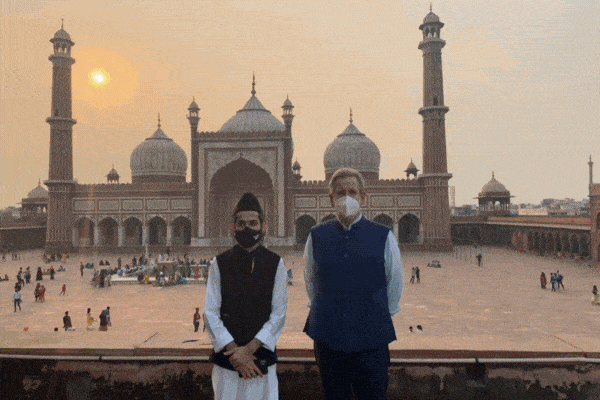
Pawan Luthra: Did you feel that you were able to make more breakthroughs because of your political background, despite the bureaucratic and other challenges?
Barry O’Farrell: Clearly, the pandemic was the biggest challenge. And despite that, we moved the dial forward. There were bureaucratic blockages and some of them I’m still a bit raw about. But can I say that the people from DFAT who I worked with, were a remarkably skilled, professional and hardworking cadre of people. And without them, we could have got none of this done. Part of my taking on the role was not to pretend that I was a trained diplomat; the people alongside me in Delhi, Chennai, Mumbai and Calcutta have been probably at a minimum, on an average, diplomats for 10 years – they are skilled in the art of diplomacy. And what I would try and bring to the table was that if we were getting nowhere, using the usual diplomatic route, I would do it the politician’s way, and do what Indians try and do, ie try and find the jugaad, to achieve the goal by another means. That, plus the fact that as I said earlier, I was prepared to ask direct questions – sometimes diplomats will only ask questions that they know the answer to. And they do that for a good reason, which is they don’t want to cause any damage to the country’s reputation. Whereas politicians will ask anything and everything. And if people say no to us, we don’t curl up in a ball and quiver. We just move on and ask another question.
Pawan Luthra: Did you ever figure out the sideways head nod in your three years in India?
Barry O’Farrell: I know the thing is to pivot it on your chin, and I have quite a number of chins! So that was the reason I can’t do it. But it is interesting.
Pawan Luthra: Let me go back to 2020. You arrived in Delhi to COVID, and no training wheels to ease into your new position. Instead, it was full speed ahead. India was hit hard by the virus. How concerned were you and the family then?
Barry O’Farrell: We arrived a month before lockdown. Lockdown, we knew was going to be announced after Janata Curfew, the trial that Mr. Modi had. DFAT asked us to return spouses to Australia along with families and to reduce the size of the embassy, because the world didn’t know what was going to happen.
People are now critical of some of the estimates that were made. But at the time, we did think this was going to be like the flu epidemic back in 1919, with similar results. When I said goodbye to my wife Rosemary, we’d convinced ourselves that we’d be apart for six weeks. It was 10 months.
But to come to your question, lockdown in Delhi was one of the longest in India. I never felt at risk. We were worried because we didn’t know what was going on. We had our safety protocols. We’d wipe down benches each night and each day wipe handles, we’d wear masks. We did all the things we were asked to do. And we did it as a group of people together, supporting each other. And when vaccines became available, vaccines I have in my body, India’s vaccines, I never had any doubt about them. In fact, if I’m honest, when I went to India I was more fearful of contracting dengue fever than I ever was of COVID. Because we didn’t know about COVID at that stage, but knew that dengue never quite leaves you.
Alongside the isolation challenges, you were also looking at an emerging opportunity to turbocharge the bilateral relationship. Talk us through the opportunities and threats you saw in this relationship then, and your thoughts on where we are at the end of your tenure – the bigger picture.
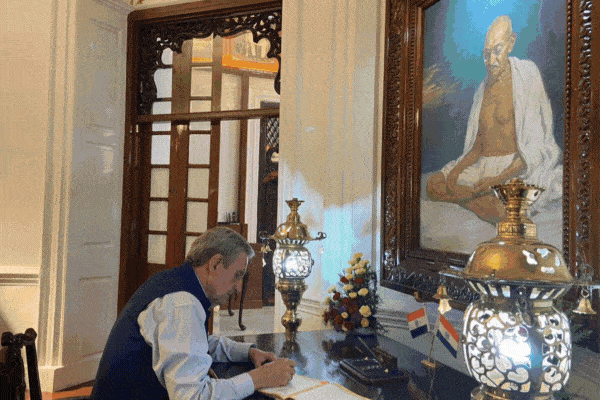
The bigger picture is that defence, security, education, research and science were very strong parts of relationship when I arrived; they are even stronger now. What wasn’t doing well, was the economic relationship. And we had, as you’ll recall, a number of years earlier, some concerns about diaspora issues in Australia in terms of whether Indian students were safer and the like.
So, nine weeks after lockdown, we have a virtual summit between our Prime Ministers, Mr. Modi’s first such summit.
The comprehensive strategic agreement that the relationship was elevated to, at that summit, was intended to be signed in person by the Prime Ministers in India. In January of that year, we had to renegotiate the whole partnership with the Ministry of External
Affairs MEA. For reasons that to this day I do not understand, but reasons that Australia should be grateful for, at the last minute, India asked for a new line to go into the agreement, and that was to reopen negotiations towards a Comprehensive Economic Cooperation Agreement. So nine weeks after lockdown, when we were just starting to learn the economic lessons of COVID, about trusted suppliers and supply chains, India was already working on how to sort that out for the future. And Australia has been a beneficiary. And so that I think, the single biggest thing we owe is a debt to India, not because we weren’t keen on a trade deal, but we’d tried earlier in 2014 and we had failed. And there was nervousness within the bureaucracy, about trying again, whereas the Australian Government was very keen, but didn’t want to do it with India unless India wanted to do it. So it was very convenient that India put the proposal forward. We accepted it. And as I’ve said, time and time again, what we’ve seen over the last three years, has been because of political will on both sides of the Indian Ocean.
And that I think, is the significant issue for me: whilst we’ve seen improvements elsewhere, the single biggest thing we owe is a debt to India, not because we weren’t keen on a trade deal – we’d tried earlier in 2014, and failed. There was nervousness within the bureaucracy about trying again, whereas the Australian Government was very keen, but didn’t want to do it with India unless India wanted to do it. So it was very convenient that India put the proposal forward. We accepted it. And as I’ve said time and time again, what we’ve seen over the last three years, has been because of political will on both sides of the Indian Ocean.
Tony Abbott came to India in August of 2021, to enlist PM Modi’s support for the free trade deal. I was in the room, with Mr. Modi and Mr. Abbott, and we got that political will. As a result, by the following April, we had the Economic Cooperation and Trade Agreement. ECTA as Mr. Modi continues to say, means unity in Hindi.
That political will, happily for Australia, has continued with the Albanese government as well. This is a remarkable period in Australian history, where for the first time, we’ve had two successive governments just as committed to the India relationship, putting in a full-time effort. And look Pawan at what we’ve achieved in the first three and a half years. My tip is during Phil Greens’ time in India, we’ll achieve even more.
Also Read: Australia’s new High Commissioner to India named
Pawan Luthra: Fantastic. So there is political will. Talking about the potential opportunities, we have seen a determined push to foster the business relationship. In your three years in India, have you seen Australia being a hard sell to Indian businesses? And vice versa, has India been a hard sell to Australian businesses?
Barry O’Farrell: India is welcoming increasing Australian investment, whether it’s what Macquarie Bank’s already doing there, or frankly ANZ who had a good operation in India, or what Atlassian is doing (using the brains of India), whether it’s the critical mineral and rare earth mines that are feeding important sectors of the Indian economy (not just solar PV and battery industries, but also electric vehicles),
whether it’s the fact that Mahindra cars and tractors that have been coming here for years are going to keep coming, or other car manufacturers in India making very good cars (car manufacturing, which we no longer have, India has in spades). The challenge, of course for Australia on that equation is, we’re only a country of 25 and a half million people, or as I like to explain, the same number of nine-year-olds as there are in India. So we don’t offer a huge market. But we do offer a niche market, a magnificent market for the tech companies.
If I have a criticism, which probably increasingly I’ll talk about now that I’m not in the job, it’s that Australian business at times are a bit reticent to go and see for themselves what the opportunities are. Partly because of the old India stories – where Australian companies went there with huge expectations, and no real literacy as to how the system worked, and some of them failed. But you know, it’s a bit like a travel story. Sometimes you only remember the bad ones, but you should remember the good ones. And so I think there’s enormous opportunities, for instance in the tech sector. In India, there’s investment opportunities for people in small and medium sized enterprises; there’s opportunities for our superannuation funds in the $184 billion infrastructure program that India’s got in place. The number of airports has doubled since PM Modi (came on the scene), and the number of national highways has increased (enormously). Businesses need to go and have a look at what’s on offer: whether it’s BlueScope Steel partnered with Tata Steel, now producing a huge profit out of India compared to their old Australian-only profit, whether it’s some of my favourite stories of young kids of people who migrated to Australia, including one who now sells coffee, high priced coffee in high price supermarkets, to Indian citizens, and who tells me that his parents couldn’t believe that he was going back to India for opportunity when they left India to come to Australia for opportunity!
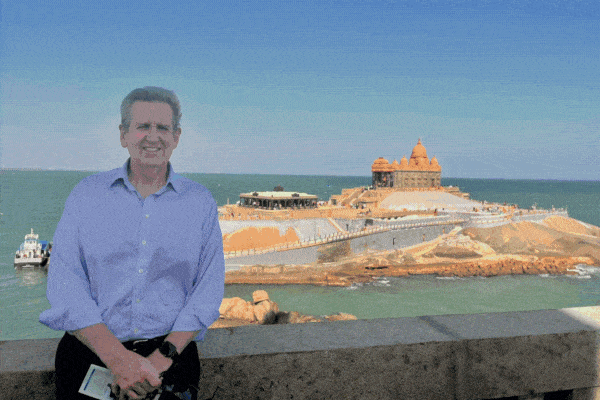
Pawan Luthra: So interesting, Barry, that you emphasize that people need to get to know India better. You’ve travelled the length and breadth of the country, leaving no state behind, including the Northeast. What is it about India that you found fascinating? And what excites you the most about it?
Barry O’Farrell: What excites me most is that for the first time, I lived in a country where there was a climate change policy statement, where state and federal governments were on the same page. And that meant that business had the certainty with which to invest. So travelling the length and breadth of India, I saw some of the biggest solar farms I’ll ever see in the world. Driving between Bengaluru and Hampi for three and a half hours I saw some of the biggest windmills I’ve ever seen. Whereas in Australia, we complain about seven windmills over the back of Lake George on the way to Canberra! Just the scale and dimension by which India is pivoting to renewable energy (is incredible). I think last year, its growth in capacity in that sector was the third largest in the world. So for a country like Australia, that’s looking to be a renewable energy superpower because of the resources and the tech that we bring to it, India is a natural partner.
Some of the challenges though, are of course the fact that unlike Australia when we introduced our GST, many of the state taxes that we used to complain about disappeared. Regrettably, whilst the ECTA trade deal reduces centre or federal tariffs on wines
there are still state taxes on wines. We’re now looking to see how we can work with states to get them to relax some of those because we’ve made a big difference at the centre level. But states also impose some difficulties around regulatory problems, like labelling laws. We got rid of individual labelling laws by state in Australia decades ago; India’s starting to get there. Also sometimes regrettably, it involves a degree of corruption in some state or another.
Pawan Luthra: You seem to have built a fantastic relationship with India’s External Affairs Minister Dr. Jaishankar. I understand his wife and your wife Rosemary play mahjong together. And in fact, you famously danced at a Garba function hosted by Minister Jaishankar. Dr. Jaishankar was a diplomat who became a politician. Barry, you were a politician who became a diplomat. What sparked a mutual admiration for each other?
Barry O’Farrell: Well, firstly, Rosemary was fortunate enough to join other spouses of ambassadors’ roundtable to play mahjong every week or every fortnight, only to discover that Mrs. Jaishankar was a member. Rosemary never played mahjong in her life and didn’t think she was very good, but she enjoyed it. She’s looking for a group here to play with now that she’s back.
It’s untrue that I danced at the Garba festival. I never danced at my own wedding, which was an ongoing issue with my late father-in-law. You’d be lucky to see a picture of me doing more than swaying. And it’s not because of the alcohol. That’s the most I have ever let go. But the Garba festival and seeing Jaishankar and the young people there was quite an eye opener. Look, I think that Minister Jaishankar and I got on well, because he was learning what I knew a lot about the way politics works. And I was trying to learn what he knew a lot about, which was diplomacy. I remember one interaction with him. I can’t tell you what the subject is because I’m bound by the Official Secrets Act, but I was asked to go and deliver Australia’s message to him on this particular issue. I took my then deputy with me, so he knew it was a serious issue because I was bringing the professional as well as myself. I delivered the message, and he immediately looked to my deputy, who gave a head nod to confirm that what I was saying was the real deal, not something a former politician just made up on the spot!
We know that he was within a year or two of Modi becoming PM, appointed head of the MEA. But from the moment Modi was elected, he was the engager with the world. He invented the Modi hug. Tony Abbott, the Australian PM was the first prime minister from anywhere in the world to greet him, which is why Abbott was used on the trade deal. PM Albanese within two hours of being sworn in, jumped on a plane to Japan to meet PM Modi amongst the other Quad leaders. So the level of enthusiasm is there. And I think what Dr. Jaishankar has done is to put an intellectual framework around what is PM Modi’s instinct, which is to deal with the world. Modi knows that India is strong enough, is good enough, to compete internationally. It does so in sport. It does so in tech. Why can’t it do so everywhere? And that seems to be Modi’s message to the world. Dr. Jaishankar has worked out that it’s a world in which some of our traditional institutions have lost effectiveness since World War II (United Nations in the spotlight here because they’re no longer as good at getting solutions as they have been in the past). He works through what he calls ‘plurilateralism’, a word I’d never heard of before. What it effectively means – and I think it’s diplomatic – is that if you can get something done with two or three countries, which achieved the right outcome, do it with the two or three countries, not the bigger forum where it’ll take years, if not decades, to get it on the agenda. So India under Modi and Jaishankar are very good at projecting the Indian view of the world and getting results for India, because Jaishankar knows how to work the system.

Pawan Luthra: What role do you see Australia and India playing? As we go further along in this century, there is the waning of the American influence and the rise of China.
Barry O’Farrell: Firstly, if you start with climate change, there is no solution in the world without India being part of it. It is a large country that’s just got to the position where it wants to start to deliver the infrastructure that the rest of the world has. And it’s been told in one sense, you can’t do it because it’s going to pollute. So for instance, India already has a massive demand for more than 60 million tonnes per year of hydrogen, and that’s going to grow exponentially. Australia has the capacity to partner with India to deliver better climate change outcomes for India and the world. That’s the first thing. Secondly, I think through continued cooperation at a defence level, and at a strategic level, we will continue to have an oversized influence in the Indo-Pacific. Increasingly, as Japan, US, India and Australia cooperate through the Quad in trying to shape a region where serenity, freedom, peace and prosperity are the norms, when countries step out of line, we seek to ensure that they know they’re doing the wrong thing. And that’s not threatening. It’s about trying to have some order. Because we know whether you’re running a media business, whether you’re running a High Commission or any other business, there have to be some rules that we abide by, that aren’t meant to limit anybody but are designed to ensure that even the smallest voice gets heard.
Pawan Luthra: Barry, while India is powering ahead economically, there are issues that sections of the world community are concerned about, such as the treatment of minorities and the erosion of democratic values. To turn a blind eye to this, is being a bit naive. Now that you’re not High Commissioner and diplomat, what are your thoughts on these issues?
Barry O’Farrell: First of all, I should reassure some people that I’ve seen under two governments, very frank conversations held, minister to minister, about some of these issues. People should not be in any doubt that Australia doesn’t project its values to the world, in dealing with all countries. It’s just that very few outcomes in the world are ever achieved by using megaphones rather than constructive private conversations. And we will continue to, I’m sure my successors infinitum, will continue to do that whilst they’re in India. I have raised issues around communalism, around human rights, at all levels, during my travels and in my role as High Commissioner in India, with presidents of political parties through to other organisations, and always inquired what it was going to take to stop communalism, seemingly to me, being part of the usual election tactics within governments. And as Peter Varghese said – and I suspect he’s even more right after Karnataka – that there’s nothing wrong with India’s democracy that India’s democracy cannot fix. And for those concerned about democracy in India, I think they should look at the Karnataka election result, where the BJP were given a hiding, a landslide loss. Congress returned to power after a huge turnout of almost 74% across the state. Now that’s almost 50% more people percentage wise, than will vote in the next presidential election in the US. The BJP knew they were going to lose, and yet they still lost. Despite all the criticisms and comments and rumours I’ve heard about electronic voting machines. In the time I’ve been in India there’ve been lots of elections, and every election it was trotted out, they’re crooks, they’re rotten. That’s what the losing party always says. Well in Karnataka they counted the votes for Congress, presumably because people voted for Congress. So I have no fear about the electoral process. I met the new Electoral Commissioner only weeks before I left and he’s committed to transparency. He’s up to the task of making sure the system works well.
I’ve said this, both semi publicly and privately that the biggest challenge is not the regional parties coming together to provide real opposition. It’s the fact that the opposition in the Indian parliament isn’t functioning. I had a 20-year career, I’ve said to Congressmen in India, a 20-year career, 16 years in opposition for the first 16 years. And I thought, at various times over the 16 years, that I was part of the world’s worst opposition, because it was truly appalling. And yet, I go to India, the world’s largest democracy, and the main opposition party is barely functioning within the parliament. It should be troubling to them that in order to get an opposition into the field for the next election, it’s being left to some of the oldest and canniest and most experienced regional political leaders in India, rather than being led, as it would traditionally be, by Congress. That’s the real risk, because I strongly believe that a good opposition makes for better government.
Pawan Luthra: So what should the opposition do in India to make themselves better?
Barry O’Farrell: I have no prescriptions. I’m simply identifying what I think is my biggest problem about India’s democracy – the lack of an effective opposition in the Lok Sabha and in the Rajya Sabha. And the fact that is as important, is regional parties are at a state level in India – I’m not sure they’re a substitute for an effective opposition in the centre.
Pawan Luthra: One of the issues which has been of concern in the last few months is the emergence of anti-India groups in Australia. Publicly both PM Modi and Foreign Minister Dr. Jaishankar have raised this with PM Albanese and Foreign Minister Penny Wong, and I’m sure with you. Is Australia doing enough to safeguard India’s feelings on this topic?
Barry O’Farrell: We are, and I’ve been explaining to people at all levels in India, that Australians are just as annoyed, at least I speak for DFAT and for the government. Because we regard ourselves as one of the most successful multicultural, multifaith communities in the world, with more than 250 ancestries, where a million people claim Indian ancestry. What I suspect is a very small handful of people are adding graffiti to Hindu temples in Australia, as a means of protest. Whilst peaceful protests are welcome, what we saw in Melbourne on the 26th of January is not welcome. Protesting and presenting India in a particular way, but with violence involved, is unacceptable. It blackens our reputation as a safe, successful multicultural multifaith community. I understand why Indians in Australia whether they’re Hindu or Sikh or others, will be concerned about what’s happening. The good news is that PM Albanese has not been slow saying that state and centre agencies will be used to try and identify and prosecute those responsible. I have no doubt that if some of those found responsible are found to be in the country unlawfully, claiming to be tourists or visitors, they will be dealt with swiftly as well. That’s my belief, not my knowledge. The $40 million fund, which previously was used for Jewish synagogues to protect places of worship at risk, is now being extended to Indian places of worship at risk as well. I think the Australian Government’s angry by what these people are doing. As former Premier of NSW, I could no sooner stamp out graffiti, than I could dictate what time the sun came up in the morning. Because regrettably, for every 10 people that do the right thing, there’s one, or maybe even point one of one, who will do the wrong thing. This handful of people are projecting a very big shadow, but doing damage both to Indians’ belief as to whether Australia is safe for people practicing the Hindu religion, and to the reputation of our country.
Pawan Luthra: I know you’ve only been back for about a week, but still, looking ahead for you personally, what’s next in line for you? What road beckons, now?
Barry O’Farrell: Before I left, I was director on a number of not-for-profit charity boards, and on a couple of famous sporting boards, which are not so famous these days, perhaps infamous, and I was CEO effectively of a technology company in the racing industry. I think the one thing I want to be is an advocate for the India-Australia relationship. I’m old enough to remember that at another time, in another relationship, there was a lot more discussion in Australia about the opportunities on offer in that other country. And I don’t see the same level of community-business-media discussion. So you will see me, you will hear me, in a variety of fora talking up what I think the opportunities are in India. And as I used to say when I was in politics, don’t take my word for it. I would always take businesspeople, university people with me to India because they are much better at picking the opportunities. My background is not in business. But I’ve been in India for three and a half years, interacted full time with business there, seen business come, and seen opportunities. And I know that any businessperson in Australia in whatever sector can go to India and find something, and know that even a small fraction of the Indian market can be massive in Australia.
Pawan Luthra: Thank you, Your Excellency Barry O’Farrell, for sharing your thoughts, vision, and wisdom with us.
Barry O’Farrell: Pleasure. Thank you.
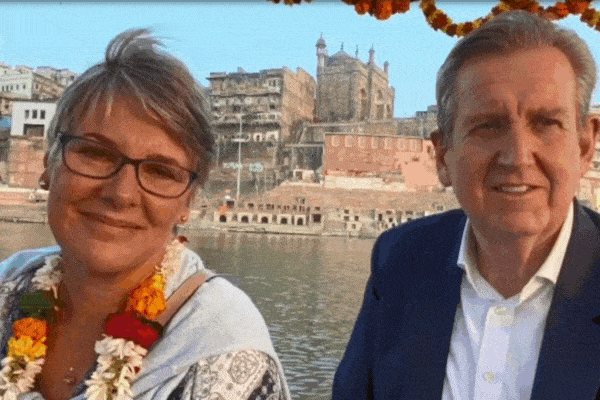
UP CLOSE AND PERSONAL WITH BARRY O’FARRELL
Q. One word to describe India?
A. Incredible. Best advertising slogan in the world and the most accurate.
Q. One thing you will miss about India?
A. Books. Bahri Sons Bookshop in Khan Market, New Delhi. The fact that books are so cheap. Books got me through lockdown. I’m bringing back too many books to Australia. My wife may leave me because of the number of books I’ve returned with.
Q. One activity which you wish you had undertaken in India?
A. I wished I’d gone trekking in either Ladakh or Bhutan, which I know is not in India.
Q. Besides diplomats and politicians, one person you met in India who inspired you?
A. Kiran Mazumdar-Shaw, Australian alumni, billionaire, Biocon founder and owner, and a remarkable individual.
Q. One thing which made you angry or uncomfortable in India?
A. Communalism.
Q. The Indian dish you’re going to miss?
A. Any of the breads. But hopefully that will mean that I’ll lose the five kilos I put on in India.
Q. Your suggestion to anyone from Australia who’s planning to do business in India
A. Go with open eyes and do not pretend that you understand India. too many people go there with too high an expectation. India is not always easy to do business in. But once you’ve navigated the system, they can be quite successful and stable.
Q. Politics or diplomacy, which is more fun?
A. I think they come a draw. Both have great moments, and both have incredibly frustrating moments.
Read More: New Aust High Commissioner to India, and Bengaluru’s first Consul General





